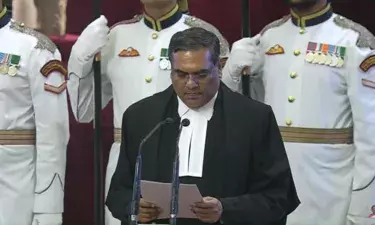Who is New CJI Sanjiv Khanna: Know His Journey, Career, and Remarkable Judgments
Veteran Supreme Court Judge Known for Landmark Rulings Assumes Six-Month Term;

Senior Supreme Court judge Justice Sanjiv Khanna took oath as the 51st Chief Justice of India at Rashtrapati Bhavan on Monday, November 11. President Draupadi Murmu administered the oath of office to him at 10 a.m. He will serve a six-month term as the Chief Justice of India.
Justice Sanjiv Khanna is the second most senior judge of the Supreme Court. His name was proposed by outgoing CJI DY Chandrachud for the role of Chief Justice. Chandrachud retired on November 10 after serving from November 9, 2022.
Who is Sanjiv Khanna
Born on May 14, 1960, Justice Sanjiv Khanna started his legal career as a lawyer with the Delhi Bar Council in 1983. He has extensive experience in constitutional law, taxation, arbitration, commercial law and environmental law. Sanjiv Khanna's father Justice Des Raj Khanna was a judge of the Delhi High Court and his mother Saroj Khanna was a Hindi lecturer at DU's Lady Shri Ram College.
Judiciary Career
- In 2004, he was appointed Standing Counsel (Civil) for the National Capital Territory of Delhi.
- Justice Khanna was appointed Additional Judge of the Delhi High Court in 2005
- He became a permanent judge in 2006
- On January 18, 2019, Justice Khanna was appointed as a judge of the Supreme Court
Remarkable judgments
- Justice Khanna was part of the bench that took suo motu cognizance of media reports alleging sexual harassment against then CJI Ranjan Gogoi in April 2019.
- In 2019, Justice Khanna wrote the lead judgment on behalf of the Constitution Bench, which held that the RTI Act applies to the office of the CJI.
- Justice Sanjiv Khanna's judgment in Amish Devgan vs Union of India is notable for emphasising the need to regulate hate speech.
- Justice Sanjiv Khanna dissented from a 2-judge majority in 2021, saying that the requisite procedures were not followed for the Central Vista project.
- Justice Khanna wrote the judgment on behalf of the Constitution Bench, which held that divorce can be a ground for the Supreme Court to grant divorce using powers under Article 142 of the Constitution.
- Justice Khanna considered the politically sensitive cases relating to the bail pleas of Aam Aadmi Party (AAP) leaders Arvind Kejriwal, Manish Sisodia and Sanjay Singh in the Delhi liquor policy case.
- His bench denied bail to Manish Sisodia in 2023 but directed that the trial should be completed expeditiously.
- The ED allowed the bail after facing some questions from Justice Khanna's bench in the Sanjay Singh case.
- In a first-of-its-kind order in May this year, Justice Khanna's bench granted interim bail to then Delhi chief minister Arvind Kejriwal for the purpose of election campaigning.
- Justice Khanna's bench granted interim bail to Kejriwal in July and referred the matter to a larger bench to examine the need to include more grounds for arrest under PMLA to prevent misuse of the law.

